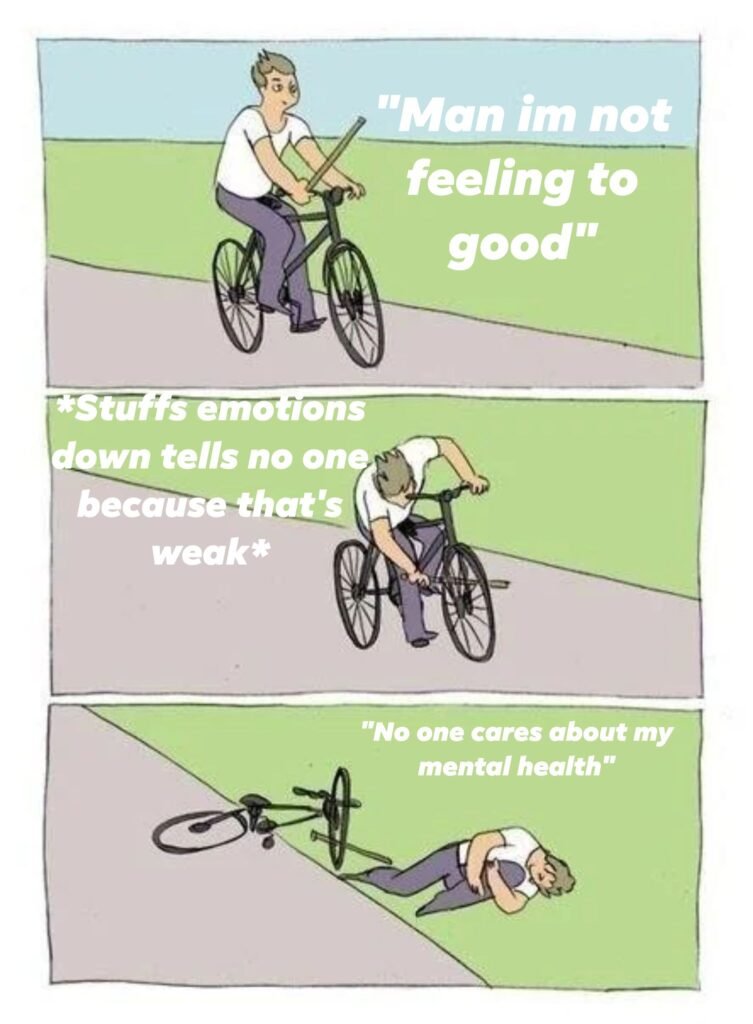Men’s Mental Health Month
Scrolling through social media recently, I came across a post that read:
“Men take pride in suffering in silence. Stuffing down their emotions and telling everyone ‘I’m fine’ when they’re not, thinking that’s what strength is. Then turn around and blame their suicide rate on nobody caring how they feel… Am I trippin’ or is this just another way of men avoiding accountability for the damage they do to others and themselves?”
Initially, I was ready to fire back. I wanted to say: “You are really trippin’. Men don’t avoid accountability—we don’t give men enough space to be victims of circumstance. Accountability means ownership, yes, but sometimes all the control in the world can’t change the outcome. It’s easier to accept setbacks when you have space that doesn’t demand constant results. The male suicide rate being so much higher shows us how much men will act when they feel responsible, but lack support. Society has to do better at reminding men: falling doesn’t mean failure.”
But that was my emotional reaction. Here’s my refined, emotionally grounded response:

Do Men Suffer in Silence Out of Pride or Honor?
First, let’s differentiate between pride and honor. Pride is ego-based. Honor is cultural, often rooted in values and spiritual beliefs. Men don’t want to suffer; it doesn’t make us proud. We endure because we believe in pushing forward. I’ve often said, “If there is no struggle, there is no progress.” That doesn’t mean I welcome struggle—only that I am resolved to grow from it.
Silence in men isn’t about ego; it’s often survival. And sadly, we’re in a national crisis. COVID intensified mental health issues, and we’re seeing a wave of men “crashing out” due to unprocessed trauma, emotional miseducation, and isolation.
As an educator and mentor, I see this firsthand. Boys aren’t taught how to process emotions, so they become men who can’t. Silence is their language, their protection, their addiction. Without intervention, silence becomes deadly.
“I’m Fine” and the Myth of Emotional Accountability
The phrase “I’m fine” is both a shield and a survival tactic. We hear slogans like “just ask for help” or “you’re not alone,” but how often do people know how to receive someone in distress?
We don’t just need men to open up—we need a national initiative to teach people how to be safe spaces. Many lack the emotional literacy to listen, to be empathetic, or to know how to respond.
Your presence might be someone’s lifeline. A compliment. A genuine question. A listening ear. These small acts can make a man delay a destructive decision.
Silence as a Coping Mechanism
Just like addiction, silence becomes a way to manage pain. Many men were never modeled how to be vulnerable, so they hold everything in. Add in being misunderstood, dismissed, or laughed at, and silence feels safer than expression.
Let’s combat that by:
- Removing stigma
- Practicing active listening
- Asking others to share and reflecting back what you hear
- Challenging ourselves to listen, even to those we disagree with
Do Men Blame Suicide on Being Uncared For?
Some say men blame the world for not caring. I say: look at the landscape. Services for men are scarce. As a Black male veteran and entrepreneur, I know the support systems are limited.
- Male educators? Only 2% of the profession.
- Mental health services for men? Rare.
- Safe spaces for men to vent? Almost nonexistent.
We need more male mentoring programs. More grants for male-led initiatives. More culturally competent spaces for male expression.
Personal Reflection
I never saw a therapist until my late 20s. We had love in my household, but we didn’t have mental health. We had the Bible. I had anxiety, depression, speech issues, and performance fears. I managed. But what if someone had helped me work through it at 11 or 12?
I’ve lost friends to suicide. It changed me.
I’ve had dark moments too, but my belief in my purpose has kept me standing. And I’ll continue to stand—because I know I’m not alone.

Closing Thoughts
Support men by:
- Teaching boys emotional literacy
- Creating spaces where men can be heard without shame
- Funding male-centered mental health services
- Acknowledging men’s pain without dismissing it as weakness
Men deserve more than slogans. We deserve support.
Be Wise. Be True. Just Inspire.
If you or someone you know is struggling with suicidal thoughts, please call or text the Suicide & Crisis Lifeline at 988. Help is available. You matter.






